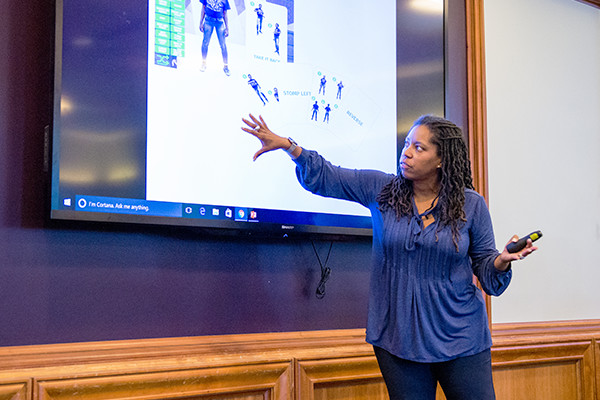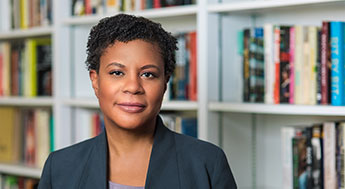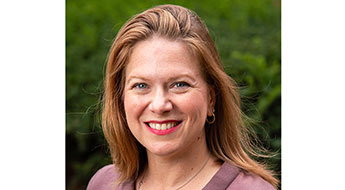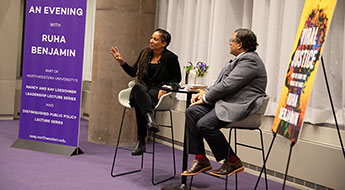Conference Highlights the Power of Social Relationships
Two-day event features wide range of disciplines
Get all our news

The conference highlighted new insights involving social relationships in homes, schools, online communities, and organizations.
The social connections we create throughout life can impact everything from self-esteem and
Co-sponsored by the Office of Global Initiatives at Northwestern’s School of Education and Social Policy (SESP) and the Institute for Policy Research (IPR), the two-day event featured influential scholars and graduate students from a wide range of disciplines, including human development, learning sciences, psychology, economics, and education.
“We’re learning, growing, and thriving all throughout our lives,” said SESP Dean and IPR economist David Figlio. “The life course perspective—a hallmark of SESP and IPR—is especially powerful when it’s combined with an interdisciplinary perspective.”
The conference highlighted new insights involving social relationships in homes, schools, online communities, and organizations. Harvard University’s Mario Small presented key findings from his new book Someone To Talk To, while several other researchers presented work examining how social interactions influence learning and inequality.
“Social relationships are fundamental to understanding responses to
One session explored how environments that promote “making” can help researchers understand the relationship between social interaction and learning.
In her talk “Hands and Eyes,” Northwestern’s Shirin Vossoughi, assistant professor of learning sciences, argued that “equity” in maker spaces means more than access.
Vossoughi uses video footage to study how teachers use their gestures, gazes, and language as they work with students. Equity in maker spaces is not just the absence of inequity, Vossoughi said. “It’s also the presence of educational dignity.”
While Vossoughi closely examines a teacher’s role in a maker space, Reed Stevens, co-creator of the FUSE Studios program, professor of learning sciences, and an IPR associate, looks at how students interact and collaborate with one another. In FUSE, teachers support students; children rely on each other for help and develop what he calls "relative expertise."
"It’s empowering for the students to be known as ‘good’ at something,” Stevens said. “It’s often the students who aren’t high achieving who are recognized as knowledgeable.
“Relative expertise can help students learn to be open to help and feedback in a different way,” Stevens added. “Overall, it leads to more use of the know-how in the room."
Creating optimal learning environments
In her keynote address, Northwestern’s Nichole Pinkard, associate professor of learning sciences, explained the value of creating supportive learning spaces, both on and offline.
Pinkard’s three major projects—Digital Youth Network,
“We have individual programs, but not a one-stop shop where young girls can spectate, practice, level up, and perform,” she said. “A complex learning ecosystem is necessary to create and sustain an identity for middle school girls over the years.”
The conference also featured 10-minute flash talks by Northwestern doctoral student scholars in learning sciences and human development and social policy, including Emily Hittner, Olivia Healy, Phoebe Lam, Kit Martin, Peter Meyerhoff, Mollie McQuillan, Emily Ross, Jacquelyn Stephens, and Ryan Svoboda.
For Hittner, the flash talk was a fun and thought-provoking way to share her team’s results that emotion regulation does not reduce anxiety in a one-strategy-fits-all manner. “Rather, the relationship between emotion regulation and mental health is different across the socioeconomic spectrum,” Hittner said.
Overall, Hittner said she appreciated the different perspectives she heard from the conference speakers. “In the Life-Span Development Laboratory, we study the role of emotion and motivation in social relationships across the
Other presenters included Matthew Kraft of Brown University; Debora Lui of the University of Pennsylvania; Spiro Maroulis of Arizona State University, (Phd09); Gabriela Richard of Pennsylvania State University; Jenny Wagner of the University of Kiel in Germany; and Northwestern University professors Emma K. Adam, Jeannette Colyvas, Claudia Haase, Eva Lam, Jolie Matthews, Kirabo Jackson, James Spillane, and Celeste Watkins-Hayes.
The conference was organized by Spillane, Haase, Colyvas, Svoboda, Melissa Ortiz, Lois Trautvetter, and Marcelo Worsley.
This article was originally published by the School of Education and Social Policy.
Published: November 8, 2017.


